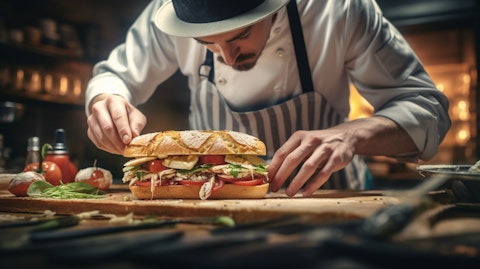Potbelly Corporation (NASDAQ:PBPB) Q3 2024 Earnings Call Transcript November 9, 2024
Operator: Good afternoon everyone and welcome to Potbelly Corporation’s Third Quarter 2024 Earnings Conference Call. Today’s call is being recorded. At this time, all participants have been placed in a listen-only mode and the lines will be opened for your questions following the prepared remarks. On today’s call, we have Bob Wright, President and Chief Executive Officer; Steven Cirulis, Senior Vice President and Chief Financial Officer; and Adiya Dixon, Senior Vice President, Chief Legal Officer and Secretary of Potbelly Corporation. At this time, I’ll turn the call over to Adiya Dixon. Please go ahead.
Adiya Dixon: Good afternoon, everyone and welcome to our third quarter 2024 earnings call. By now, everyone should have access to our earnings release and accompanying investor presentation. If not, they can be found in the Investors tab on our website. Before we begin our formal remarks, I need to remind everyone that certain comments made on this call will contain forward-looking statements regarding future events or the future financial performance of the company. Any such statements, including our outlook for 2024 or any other future periods, should be considered forward-looking statements within the meaning of the Private Securities Litigation Reform Act of 1995. These forward-looking statements are not guarantees of future performance nor should they be relied upon as representing management’s views as of any subsequent date.
Forward-looking statements involve significant risks and uncertainties and events or results could differ materially from those presented due to a number of risks and uncertainties. Additional detailed information concerning these risks regarding our business and the factors that could cause actual results to differ materially from the forward-looking statements and other information that will be given today can be found under the Risk Factors heading in our filings with the Securities and Exchange Commission which are available at sec.gov. During the call, there will also be a discussion of some items that do not conform to U.S. generally accepted accounting principles or GAAP. Reconciliations of these non-GAAP measures to their most directly comparable GAAP measures are included in the appendix to the press release and investor presentation issued this afternoon, both of which are available in the Investors tab on our website.
And now, I’ll turn the call over to Potbelly’s President and CEO, Bob Wright.
Robert Wright: Thank you, Adiya. Good afternoon and thank you for joining our call today. Our third quarter results are a showcase of our 5-pillar strategic plan working and our emphasis on driving Potbelly as a growth brand. During the quarter, we utilized our app and Potbelly Perks to drive a positive shift in our comp trajectory. In fact, we’ve driven improvement in our comp momentum through the end of the third quarter and into the fourth quarter. We also delivered a 70 basis point year-over-year improvement in our shop profit margins, metered our G&A spend to aid EBITDA growth and opened 8 new shops as we further accelerate new shop development. Despite what continues to be a challenging consumer environment, we remain focused on emphasizing what we control and positioning Potbelly for long-term sustainable growth.
The entire Potbelly team is committed to our mission to delight customers with great food and good vibes on our journey to be the most loved sandwich brand in every neighborhood we serve. Our strong customer satisfaction scores and operations metrics continue to bear that out. To our over 5,000 team members and franchise groups without whom none of our accomplishments to date would be possible, I want to say thank you for your hard work and dedication every day to making Potbelly truly special. As I stated, our success is rooted in our 5-Pillar Strategy, so I’ll structure most of my comments this afternoon around that framework. Turning to the drivers of our business. The first pillar of our 5-Pillar Strategy has always been craveable quality food at a great value.
And I’m proud to say that during the third quarter, we improved every facet of this pillar. Let’s start with great value. As we spoke to previously in late July, we expanded our $7.99 Everyday Value Combo which includes a turkey, ham or chicken Skinny Sandwich with chips and a drink across nearly all of our system. Importantly, the introduction of the combo has done exactly what we intended with low frequency, less digital, primarily in-shop customers driving value perception, stated likelihood to return and increased frequency with these important customers. Additionally, as I’ll share in a few minutes, we continue to drive brand awareness, customer value options through digital promotions and our Perks loyalty program. Next, we’ll discuss the craveable portion of this pillar.
The third quarter featured several new and distinct innovations for our customers as well as the return of a fan favorite cookie. We start with our new Farmhouse Chicken Sandwich with all the ingredients of our classic Farmhouse Salad, including all-natural chicken breast, Nueske’s Applewood Smoked Bacon, hard-boiled egg cucumbers and tomatoes, Swiss cheese and topped with our new custom Hot Pepper Ranch dressing. Of course, no meal is complete without one of our signature cookies or hand-dipped ice cream shakes. So we introduced our new Blueberry Muffin Cookie, American Apple Pie Shake and Toasted Marshmallow Shake, along with the return of our fan favorite S’mores Cookie. The new and returning menu items were a hit with our customers and, importantly, they gave us credit for innovation and keeping our menu fresh with unique items.
We haven’t stopped. Already in the fourth quarter, we introduced the Smokestack Pork & Mac sandwich featuring slow-cooked pulled pork, smoky barbecue sauce and our signature Mac & Cheese. I’m proud to say that it’s receiving rave reviews from customers and it’s mixing [ph] ahead of our expectations. And now, I’ll turn to the core menu quality. Potbelly is built on quality since 1977 and has quality embedded throughout our menu from our freshly prepared ingredients to our handmade-to-order hot toasted sandwiches. Also, our one-of-a-kind recipes made by our expert team members means that we take care to deliver a great meal every time. And we’re never satisfied. We did research with our customers and it indicated that we had some gaps in our menu in trending areas like flavorful sauces and spicy offerings as well as additional everyday higher proteins.
To address these areas of opportunity, next week, on Monday, November 11, we’re adding some new innovations to our core menu aimed at giving customers even more reasons to choose Potbelly, as well as more ways to customize their experience. I’m excited to share that we’re introducing 2 new signature sandwiches, both made with our new slow-cooked pulled pork. The new sandwich additions to our core menu are the Cubano which is a fan favorite LTO that earned its place onto the everyday menu and the Sweet Heat Barbecue Pork. We’re very excited to have this new protein added to the menu, broadening the appeal of our trademark sandwiches. We also have 2 new proprietary signature sauces that address craveable spicy flavors, including Hot Pepper Ranch and Sweet Heat Barbecue, both custom-made with our signature award-winning Potbelly hot peppers.
And we also have 2 additional sauces that customers have asked for on the Potbelly menu, including Roasted Garlic Aioli and Red Wine Vinegar. Finally, we’ve updated and expanded our available sandwich toppings to include cucumbers and roasted red peppers. Our operations team and franchisees have been training our associates for the last week on these changes and they are genuinely enthusiastic about the rollout next week. We believe this focus on our core menu will expand our customers’ options with even more flavor and customization and expand our appeal to an even broader customer base. We’re not done yet. Consumption of noncarbonated cold beverages has increased substantially in the industry. To capitalize on this, we recently completed the system-wide rollout of Potbelly Craft Refreshers at the end of September in partnership with Tractor Beverage Company.

In keeping with our brand, these beverages add more interesting and flavorful options for our customers beyond traditional fountain drinks and have a better-for-you profile as they are organic and non-GMO. Importantly, the rollout is meeting our expectations for customer satisfaction and is driving additional beverage incidence rates. In addition to craveable quality food at a great value, the fourth pillar of our strategic plan calls for digitally-driven awareness, connection and traffic. During the quarter, our digital business represented over 38% of our total shop sales, an increase of approximately 100 basis points versus last year. As we mentioned in recent quarters, we continue to see a shift within our digital mix to Potbelly-owned channels.
And again, during the third quarter, expansion of Potbelly-owned channels represented the entire 100 basis points of year-over-year improvement in our digital mix. Our Potbelly Perks loyalty program continues to be a significant driver of our business and is central to our digital strategy. Once again, this quarter, every frequency cohort of customers in our Perks loyalty program saw increased frequency, proving that our digital and Perks promotional activity as well as our base program, where members redeem their coins for Perks, is driving value for these important customers. In the end, our focus on executing our winning digital strategy is a cornerstone of growth at Potbelly. Let me now update you on our fifth pillar, franchise-focused development and, in particular, our franchise growth acceleration initiative.
During the third quarter, we continue to make significant progress across all phases of our unit growth funnel. Importantly and I’ve spoken about this before, the infrastructure we have built is showing advancing progress and gives me increased confidence in our growth for the coming quarters and years. Franchise recruitment and lead generation continues to build, especially with our in-market and in-person recruiting efforts. We’re also having great success converting those franchise candidates to franchisees through deal signings. We’re pleased to increase our total year-to-date franchise shop commitments to 86, an increase of 32 relative to last quarter, bringing our total open and committed shops to 695 shops across 33 franchise groups.
And I’m proud to say that our franchisees are meeting their development commitments which strengthens our expectations of continued growth through the remainder of 2024 and into 2025. Lastly, during the third quarter, we opened an additional 8 shops for a total of 15 openings year-to-date through the third quarter. We’ve already opened 2 additional units in the fourth quarter as well. With our current development pipeline, we expect to open 9 to 11 total shops in Q4, resulting in another quarter of accelerated development and a total of 24 to 26 shops for the year. As we close in on the last few weeks of 2024 development, there are some shops that have experienced short-term impact to their development time lines. And I want to be clear. These are small delays and these shops will be opening soon.
2024 is shaping up to be our best unit growth year since 2017 and we’ll end the year with a record number of franchise shops representing approximately 22% of the system. We anticipate our unit growth to further accelerate from here. Finally, our new 2024 shops continue to perform well in this evolving consumer environment. We believe the success of these shops is a sign that our market planning and real estate systems are working and you’re seeing the early tangible results of the growth engine we’ve been building on our path to 2,000 units in the United States. I assure you that we are just getting started. With that, I’ll now turn the call over to Steve to detail our financial performance for the third quarter.
Steven Cirulis: Thank you, Bob and good afternoon, everyone. System-wide sales were approximately $139.2 million, an increase of 1%, driven by system-wide unit growth. Revenues in the third quarter were $115.1 million with company-operated shop revenue of $110.8 million, lower year-over-year, driven by the short-term impact of last year’s refranchising efforts. Contrast that with our franchise revenue of $4.4 million, up 79% relative to the third quarter last year, driven by a 30% increase in franchised units. Last year, we successfully used refranchising as a catalyst to drive new franchise unit commitments. We have deemphasized refranchising our company shops in 2024 due to our strong pipeline of franchise unit sales in new markets.
Also, the negative impact on revenue growth from last year’s refranchising transactions is largely behind us. We will likely end the year with only 1 refranchised shop in 2024 versus 33 in 2023. Average weekly sales were approximately $24,870 and company-operated same-store sales were down 1.8% in the quarter, near the high end of our expectations. Our shop level margin expansion of 70 basis points annually to 15.3% against the backdrop of slower sales is a result of some external tailwinds and, more importantly, diligent execution. Turning to expenses. Food, beverage and packaging costs were 26.6% of shop sales, a 120 basis point improvement versus the prior year period. This was driven by a combination of commodity deflation and a modest pricing action in the quarter.
Labor expenses were 29.1% of sales, a 20 basis point increase versus the prior year period. This was predominantly due to increases in employee group insurance that more than offset favorability from ongoing optimization of our hours-based labor guide. Occupancy was 10.7% of sales, in line with the prior year period. This was predominantly due to leverage on our fixed rent being offset by increases in common area maintenance and in variable rent charges as many shops with those types of lease arrangements like airports continue to outperform prior year. Other operating expenses were 18.3% of sales, a 30 basis point increase versus the prior year period; this was predominantly due to increased brand fund spend. General and administrative expenses which are best viewed as a percentage of system-wide sales as they are used to support every one of our shops, were 7.6%, a decrease of 100 basis points versus the prior year period, driven by our focus on corporate expense management and a lower bonus accrual.
Third quarter adjusted EBITDA was $8.7 million or 7.5% of total revenue. This 19% growth year-over-year was driven by the improvement in shop level margin, continued strong performance of our franchise shops and ongoing disciplined management of G&A. We reported net income of $3.7 million for the quarter. Adjusted net income was $2.5 million or a $1.4 million increase versus the prior year period. During the third quarter, we purchased approximately 29,000 shares of our common stock for a total of approximately $230,000. Our share repurchase program is one component of our long-term capital allocation strategy. We anticipate repurchases throughout our 3-year program. Incorporating our year-to-date results, the category outlook for the remainder of the year and our momentum into Q4, we now expect our Q4 performance to land in the following ranges: same-store sales growth of negative 2.5% to negative 0.5%; adjusted EBITDA of between $7 million and $8 million.
For the full year 2024, we have updated our same-store sales guidance to negative 1.2% to negative 0.5% and our adjusted EBITDA to between $29.5 million and $30.5 million. With that, I’ll turn the call back over to Bob.
Robert Wright: Thank you, Steve. In closing, let me reiterate the tremendous job our team has done in executing on our 5-pillar strategic plan and how pleased I am with what we’ve accomplished together to date. But I believe the future for Potbelly is even brighter. Through our craveable quality food at a great value, a winning digital strategy that continues to drive awareness, connection and traffic and a strong franchise-led growth pipeline with a clear path to 2,000 units in the U.S., we’re ready to capitalize on the opportunities ahead to take Potbelly to the next level of growth in 2025 and beyond. With that, we’re happy to answer any questions. Operator, please open the line for questions.
Q&A Session
Follow Potbelly Corp (NASDAQ:PBPB)
Follow Potbelly Corp (NASDAQ:PBPB)
Receive real-time insider trading and news alerts
Operator: [Operator Instructions] Our first question is from Jeremy Hamblin with Craig-Hallum Capital Group.
Jeremy Hamblin: Congrats on the solid results in the quarter. I wanted to first come to the kind of the same-store sales trends. I think what you said was that you saw some acceleration throughout Q3 and have seen a little bit of improvement here in Q4. Wanted to just see if you could provide us with a little bit more detail behind the cadence of that. And then also within the Q3 comps, if you could give us a sense on what you saw in traffic, menu pricing and average check.
Steven Cirulis: Great. Sure. Jeremy, this is Steve. Yes, the quarter did improve for us. The beginning of the quarter was impacted a little bit by a few things, July 4 holiday and the timing of that to start the quarter. Hurricane Beryl in July was also — had some impact on our business. And flowing into then August, where we had some impact from the DNC in our Chicago market. And that was working against this consumer backdrop where we started to see things stabilize which was great. P9 for us was when we started to really see some acceleration in our performance and that momentum has carried into the beginning parts of Q4. But for things like Hurricane Beryl and the DNC, I think the earlier part of the quarter would have actually been better than we saw.
But we’re proud of the result coming out of Q3 and entering into Q4. And then as it relates to how we are thinking about the rest of the elements of Q3 in terms of the mix, the price and traffic, we had negative 1.8% same-store sales. That’s a combination of a 3.8% step back in traffic and then a 2% gain on the average check line. And then in the average check, we had an increase of about 4.4% price in the quarter and the rest is a bit of a step back in mix.
Jeremy Hamblin: Great. And then, can we assume you’re still carrying about 4% or so on the menu pricing?
Steven Cirulis: Well, we didn’t increase our price as we were thinking about our longer-term kind of view on pricing and inflation. We had a really good inflationary commodity quarter for us. Actually saw — seeing some deflation throughout the year. So we didn’t see the need to take price. And what that did for us is allowed us to kind of sit at around a 4.4% gross price, like I said, for the quarter. But as we head into Q4, we’re not going to carry forward anything from this quarter but we’ll carry forward a little bit from our previous pricing action. So we’ll have about a 3.5% gross price for Q4.
Jeremy Hamblin: Got it. That’s helpful. And then I want to come back to the unit development. So understandable some disruption here in some key markets like Florida with obviously the devastating hurricanes. As you think about the unit development here, Q4, 9 to 11 shops, as we look ahead to kind of the cadence of expectation in 2025, are you still thinking that you’re close to that 10%? And then how will that build throughout the year? Do you expect a relatively even development cycle in 2025?
Robert Wright: Yes, Jeremy. Obviously, we’d prefer to share even more development here for this year. And having 2 hurricanes hit your number 1 development territory at the peak of construction season can be a little bit of a setback. But one of the things that we’re — especially as we talk to our internal teams, our franchisees, we take a small step back. I think about a year ago, we built 2 locations. This year, it will be in that 24 to 26 range total. And to your point about cadence and acceleration, every quarter this year, we have and will open more than the previous quarter. I think there’ll be a little bit of seasonality next year that just comes with restaurant construction. And typically, you see Q3 and Q2 as your top development quarters.
We’re bucking that trend because we’re building that momentum. But until we’re ready to guide 2025 which will just be in a few months, what I’m comfortable sharing is that we already have in 2025 leases signed and shops that are in the construction process for more locations than we will open all of this year. And so when you think about that acceleration, that to me is the really promising sign and it suggests that, that momentum we’ve been trying to build is truly coming our way. Once you’ve got the lease signed — of course, we’ve got the remainder of this quarter and first quarter next year to continue to work our real estate model and help franchisees that are out there working on their next round of leases. And then the additional deals that we’re still working on this quarter and early next quarter, too.
Those usually we got locations within that 11- to 12-month range, too. So the fact that we’ve got such a great head start on the year gives us a lot of confidence in the momentum that’s to come.
Jeremy Hamblin: Got it. And then just a comment quick on the refranchising. So it sounds like there’s not going to be a whole lot of that this year. Is that kind of the expectation that we should have next year as well? Could you see 20 locations refranchised? Or at this point, do you feel content with the licenses that you’re selling on new franchises, that you don’t need to do that?
Robert Wright: Yes. I think the word you just used, Jeremy, ‘need’ is probably the right word. We really don’t need to do that. There may be a few opportunistic opportunities where it just makes sense, especially for the right shop development area agreement with the right franchisee. But I expect it will be more muted than what you just suggested. This year, at one — we’re pleased with the development agreements that we’re getting and we haven’t wanted to really use a lot of refranchising to get that. It was always part of the catalyst to get things rolling last year. And we still — I think in the long term, we would be willing to refranchise more units to be sure. But we — our goal is to get the accelerated development first. And I think that will continue into next year.
Operator: The next question is from Mark Smith with Lake Street Capital Markets.
Alex Sturnieks: You got Alex Sturnieks on the line for Mark Smith today. The first one for me, could you just give us an update on the industry? Kind of what kind of discounting are you seeing out there? And what levels of promotion do you think you need to get to in order to drive traffic? Last quarter, you mentioned screening for more value offerings. I’m kind of curious if you have anything else rolling out like the $7.99 combo to enhance these promotional offerings? Or is this kind of more so done through deals to Perks members?
Robert Wright: Yes. Great question, Alex and great to speak to you again. I think you got to start with the consumer situation. We think that largely the consumer is going to be a continuation of what we’ve seen in the past quarters. And so our posture on what we’re doing with value, what we’re doing with our marketing efforts is you shouldn’t expect to see that shift very much. And I think I’d steer you back to some of my prepared remarks when you think about what we’re doing to drive value. We’ve had, I think, exactly what we hoped for with this everyday value work that we’ve done. Remember, the $7.99 combos on those 3 skinny combos were in addition to the meal deals that we already had, where you could order chips and a drink at a discount, add that to just about anything on the menu.
And then, of course, our Pick-your-Pair is an everyday value layer for us that’s really, really important. So you put that together — and I feel really good about the everyday value layer. And recall in the previous quarter, we shared that one of the main things we are trying to do with the $7.99 combos is create a value appeal for our customers who tended to be less frequent, less digital and more in-shop types of customers. And our research and our mix on that suggests that we are enjoying the success that we designed and that we tested. And we’re really, really pleased with that. I do think — and you asked about the digital and the Perks component, too. I think that it’s important to understand how that everyday value effort works in conjunction with what we’re doing with digital, because as we bring those customers in — I shared last quarter and did again this quarter, those $7.99 customers after they’ve ordered that meal, give us much higher scores on overall value and much higher scores on their likelihood to return.
That was how it was designed, to protect that traffic on that low end where those customers were just cutting back and trying to make their wallets spread across the entire month. Well, once we have you in and we get you into the digital channels — the other thing you heard me say in the prepared remarks is that those Perks loyalty customers in every frequency cohort is seeing growth in numbers as well as growth in frequency. So bringing them in through the everyday program and up through the digital frequency channels is how we want to keep building the business. And the last thing I’d say is that we — what we’re not doing and you see others doing quite a bit of that is very, very aggressive deep discounts on core menu items at — kind of repricing the core menu.
First of all, that’s a dangerous thing to do because it really can damage the brand and it’s very expensive from a margin perspective and we just haven’t been interested in doing that. That’s why you heard us talk a lot about our profitability this quarter. It’s protecting both of those and managing through this. It’s a little bit of a bumpy time but we’re really pleased with the balance.
Alex Sturnieks: Got it. No, that makes sense. And then just kind of switching over to more of the shop size. In terms of the new store prototype, is there any updates here from last quarter? Just curious how the integration has gone and how they’ve been performing so far?
Robert Wright: Yes. As I said, we continue to be really pleased with our new shop openings. The 2 metrics that we’re always watching is how are they performing against the system-wide average weekly sales and how are they performing against their forecasted average weekly sales that the franchisee puts on that forecast. And as I said, those are the key out-of-the-gate measures of whether we’re pleased with those new openings. And we are. To your point about the prototype, I mentioned those numbers of leases that we already have, franchisees have already signed for development that goes into next year. Every one of those that’s going through the design process is starting with that standard 1,800 square foot prototypical build.
We do have some that are floating a little smaller than that because that’s how the space is laid out and that’s what they’ve leased. Some of those are a little bit larger because, again, that’s how the space is. But we start with that 1,800 square foot prototype. And the advantage for the franchisee on that average of 500 fewer square feet delivers a lot of margin enhancement on the occupancy line. So those that have been built this year that reflect the elements of design, the layout of the shop, the various decor and the furniture and fixtures that are part of that prototypical design, I’ll just tell you we’re super pleased with it. The look and feel, the prominence of the digital pickup shelf, the integration of PDK with the pickup digital monitor and everything about the flow, the access to the grab-and-go drinks, all of the things that are part of that prototype continue to work really well for us.
We’re very pleased.
Operator: The next question is from Todd Brooks with The Benchmark Company.
Todd Brooks: Congrats on a nice quarter in a really choppy macro environment. So well done. If I could jump off — just kind of looking at the fourth quarter same-store sales guidance, the down 50 basis points to down 250 basis points, can you characterize the momentum that we saw kind of end of Q3 which has continued or maybe accelerated a little bit into Q4? Just trying to qualitatively get a sense that, are we coming in towards the higher end of that and that guidance is basically giving us a cushion if the consumer slows as we get towards the holidays and things may get a little choppier with them? Or is there any way to kind of characterize what drives the tail outcomes within the guidance?
Steven Cirulis: Yes. Sure, Todd. I think — as you know, we tend to set that guidance range in an area that we feel like we can see, right, without betting on those things that we think are either improbable or impossible to see. And the range that we set at least for the full year ends up being narrowed because we can see more. The Q4 numbers themselves, I think, it’s important to note they still show sequential growth quarter-to-quarter, right, as we’re coming out of Q3 and into Q4. And as it relates to kind of where we feel things will land — look, if we’re looking at the bottom of the range, I think that would probably portend some different dynamics in the consumer environment than we’ve seen to date. And if we think about what might look like the top end of the range for us — I mean, Bob explained in the prepared remarks all the great and exciting things that we’ve got coming forward in the quarter with the new menu and the sauces and the pulled pork platform that’s about to launch.
So that — the high end of the range would mean that we’re hitting on all cylinders with those initiatives as well. So we tend to like to be thoughtful about where we set those things without betting too much on things that are not within our control.
Todd Brooks: That’s helpful. And then can you talk to — and I know we’ve got an element of weather-impacted delays going into fiscal ’25. And I know there’s been a — there’s a goal to get this model to a double-digit unit grower over time. And kind of the implied background of signed locations gives you 5 years plus of growth visibility. So the backdrop is there but really we haven’t talked about the opening outlook for number of units in ’25. Is 10% in the realm of possibility within this type of environment that we’re in? Do the delayed units get added to whatever you had been planning on for the year? Do you kind of want to manage to a specific target and you would delay some out of Q4 next year?
Robert Wright: Yes. I think that’s one of the things we have to really think through before we provide that ’25 guidance. But I think you’re thinking about it the right way. There is — once you get the momentum moving which we are excited to see now — there’s always going to be leakage at the end of any year into the next year. So those units that we’re talking about leaking this year, of course, they’re going to be 25 units. And that’s why I wanted to share a little more specifically about where we stood on signed leases. That is the — I mean, that is the trigger. Once you sign that lease, the design work begins, the engineering construction work. In fact, in a lot of cases, we start some of that knowing that it’s going to sign even though the franchisee hasn’t quite signed it yet.
The fact that we’ve already got that many, more than we’re going to even open this year gives us confidence in that trajectory. I’d like to see how the remainder of the year develops in the early part of next year before we really put a pinpoint on what next year looks like. But we are well on our way to that long-term growth range when it comes to unit count and think that the acceleration quarter-to-quarter as well as the activity in the pipeline that we can see forward and that we’re sharing today gives us confidence that the momentum will just keep building.
Todd Brooks: Okay, great. And then, one final one for me. I don’t think we’ve addressed this in a couple of calls. But when the Perks program was reconfigured into a tiered reward structure, part of the theoretical benefit of that was people opting into lower point value rewards and redeeming more frequently. And I’m wondering now that we have enough time with the revamped program, is there a way that you can talk to what the frequency lift has been from that structure relative to the prior program construct?
Robert Wright: Yes. It was a really important move for us with those 12 different menu options that you can choose and redeem your coins to bank those perks. I’ll say what we’ve said. Like you say, we didn’t talk a lot about it in detail last quarter. But there is no news here. It’s all still good news. It continues to perform the way it was designed. We’ve got a really nice spread of redemption across the various items that people can return. I mentioned that in each of the — when we break down those Perks consumers, we have 4 different frequency cohorts that we look at them in. And in every one of those cohorts, we’re growing Perks’ membership and we’re growing frequency. Now there are more than one lever to pull with this group that — if you think about the coins redemption for the various food items, that’s the foundational program.
And the fact that it’s performing as designed and as expected is really comforting to us. It tells us that, that base level of the design is working for our customers and they love it, including them moving up various levels from Rookie to Pro to Boss level. But then the other things that really don’t get seen in the program but they get seen by the users of the program are the segmented campaigns that we put out. Examples are, we’ve done some broad-based promotional activity and we’ve been able to go back to our Perks members who either participated or didn’t participate in that broad-based promotional activity and speak to them directly about their behavior. There have been times where we’ve just reached out to them and said, “Hey, because you’re a Perks member, it looks like you missed the chance to take advantage of this promotion that we just did for you.
We’ve just loaded that into your Perks account.” Well, you can imagine there are many, many, many segmentation channels that we’re doing. And within the segmentation channels, we’re doing the A/B testing on which of those outreaches work for us. And those are the ones that we continue to lean into and repeat. We still feel like we’re early innings on that level of segmentation work. We think that ultimately you get to a level where you’ve got not just cohorts and not just groups, not just archetypes of Perks members but almost a one-to-one in the future and you can really dial it in. But for the base program as well as all the other work that we do through those other marketing opportunities, yes, we’re really, really pleased with the Perks program and its impact on frequency.
Operator: The next question is from Matt Curtis with William Blair.
Matt Curtis: I just wanted to circle back on value for a moment, if I could. On the value ideas that you were screening earlier this year, could you provide perhaps an update on your evaluation of these? And I guess where I’m going is whether we can expect to see some of these come in the fourth quarter? Or is this more of a 2025 initiative at this point?
Robert Wright: Yes. I think you saw a couple of them in the deck. I didn’t speak about them specifically in my prepared remarks, Matt but if you look at the — we’ve got — one of the slides in the deck on value, you’ll see an image in there on Kids Eat Free on the weekends, for example. That was one of those things that we screened and we went ahead and implemented it. And again, we were pleased with what that did for that consumer. We know the mix of our customers who have children at home and we know the strain on the pocketbook of managing a household with more than 1, more than 2 people. And while kids meals aren’t a huge part of our business, it was a great way for us to bring some incremental value with some really high satisfaction with that customer.
Another one we did was around not so much that customer experience but more around a product experience for us with our half-price shakes on the weekends. And again, very pleased with that. So those are the types of things. Some of them that were screened, you can imagine were like the $7.99 and the other 2 combo offers that we tested that you see as kind of permanent attachments, everyday value layers. Some of those value elements were promotional types of things but promotions that can last for a long period of time. We’ve still got a very long list. We’ve got opinions and thoughts about how to test and develop against what else we see in that screening. And we’ll continue to bring that forward if we think it makes sense. I think the thing I’d emphasize is our testing methodology is not something we’ll let go of.
Even the $7.99, there were 2 other versions of those types of combos. And we wanted to make sure we knew which one really rang the bell in the minds of the customer and could deliver that enticement to hold on to that visit. And that’s why that one won. But that’s some examples of what we’ve got going there.
Matt Curtis: And then it was encouraging to see, obviously, the comp acceleration in September and I guess so far in the fourth quarter. Did you accelerate your marketing spend in the latter part of the third quarter? And maybe you could tell us what we can expect on marketing spend heading into 2025, if you have any preliminary thoughts on that?
Robert Wright: Yes. The good news is there’s real momentum because we did not increase our marketing spend. We still are spending at about 3%, sometimes at 3.1%, depending on just how the balance of the execution of that marketing plan comes through. But we do anticipate continuing to escalate that. It’s for us much like what I just said about the $7.99 testing, that pre-post net of control testing that we are really diligent about is exactly how we’d take the next step with marketing. You might recall on our way to 3% we made those moves in quarter half point increments. We did it in markets where we could test the impact of what we were adding to the marketing budget. And once we’re pleased with the returns, then we go ahead and expand that level of spend across the system, including our franchisees. And I think we’ll continue to do that. So we still see that as dry powder but we have not — we’ve not put any of that to work yet this year.
Operator: Ladies and gentlemen, we have reached the end of today’s question-and-answer session. I would like to turn the call back over to Mr. Bob Wright for closing remarks.
Robert Wright: Thank you and thank you all again for your time this evening. We really look forward to what comes next here in Q4 and look forward to speaking to you all again soon. Have a great night.
Operator: The conference has now concluded. Thank you for attending today’s presentation. You may now disconnect.
Follow Potbelly Corp (NASDAQ:PBPB)
Follow Potbelly Corp (NASDAQ:PBPB)
Receive real-time insider trading and news alerts





